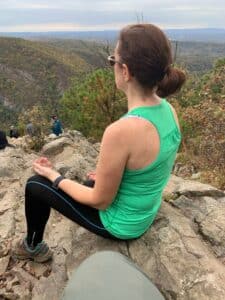Being grateful does not mean that everything is necessarily good. It just means that you can accept it as a gift.
Roy T. Bennett
I’ve been working on gratitude for decades. I have integrated it into my life with daily practices like my morning gratitude prayer, saying grace before meals, thanking people who are kind and helpful, pausing when I see something beautiful in nature and thanking God. It is when I pause and give thanks for someone or something that I feel deep gratitude.
However, I still have work to do! After a recent accident, I realized I needed to work on practicing gratitude when I found myself frustrated with my inability to do certain tasks.
I am a proud “doer”; I get things done. Acts of service is my love language. Yet, I have a hard time not doing things myself and asking others for help. I recently got injured, and at first, I was very grateful I didn’t get more seriously hurt. But a few days later, I was frustrated with my limitations and impatient with the pace of my healing. Is this a foreshadowing of what’s to come as I get older? How will I deal with the physical limitations that come with being old? (I have a hunch – not well). It took me a few days to understand why I was feeling annoyed. Not only was I physically tired, but I was irritated with my limitations.
This is when I realized I had expectations of my body that were unrealistic. I wanted to continue on as if nothing happened, but my body shouted back ‘No, not yet!’. I would not pressure someone else in the same situation to heal faster and do more. Why was I pressuring myself? This injury brought to light the truth that I get a large part of my self-esteem from the tasks I complete. Now that I can’t do certain tasks, I’m not feeling so comfortable.
While sitting with these uncomfortable feelings of irritation and frustration, and journaling on my emotions and actions, it occurred to me that my mind and my body each have their own voice. My mind’s voice is usually louder and quicker to speak up than my body’s voice. Because of this disparity, I must remember to check in with my body, patiently noticing the sensations I am experiencing to process my thoughts and emotions.
While studying under Master Choi, he asked me to consider that my mind and my body are neighbors. This little bit of separation has helped me to understand I want my mind to be a good neighbor to my body. After all, aren’t we supposed to love our neighbors as we love ourselves? I demand so much from my body, whether it’s bringing in a bunch of groceries in one trip instead of two, or pushing myself when I’m tired, instead of taking a break, I say to myself “Keep going girl!” and continue onto the next task. Although I think pushing yourself to accomplish important things is okay to do from time to time, I realize I overdo it.
Having examined this tendency about myself, what am I going to do about it? Dismiss it again? It’s time to pause and reflect. This injury has revealed an opportunity for growth and uncovered the truth about how I treat my body and why I treat it this way. This recognition was eye-opening, I now know that by being still and observing myself, I gain perspective which can result in growth and understanding. Psalm 41 “Be still and know that I am” has always spoken to me and often challenges me. I need to be still by being patient and gentle with my body even though I am more comfortable “doing” than “being”. Being patient allows me the space to understand and bring awareness to what my body is saying and why and for that I am grateful.
When I slow down to sense into my body with more quiet attention and focus, it makes me more grateful for what is, rather than frustrated for what is not. Listening and diligently observing gives me the conviction to know what I am doing is best for me and that inspires me to listen more closely. Finding the harmony between my mind and body is a song I am trying to learn. I am learning to sense the dissonance between my mind and body then patiently listen to the rhythm of my body. By harmonizing the two voices within me, I can enjoy the song and be grateful for the wisdom they bring.
The post Patience – the Hidden Component of Gratitude appeared first on Harmony.



